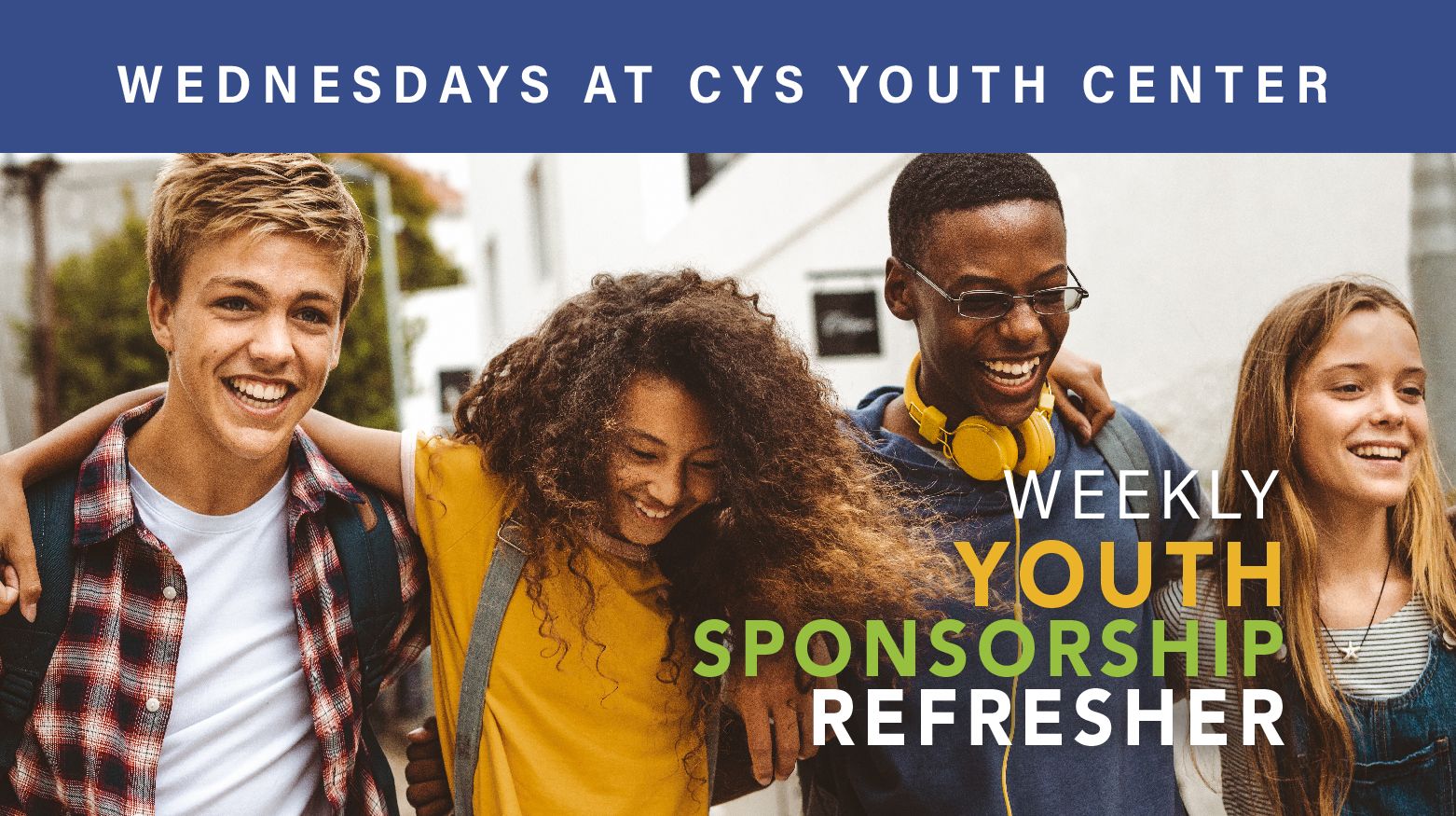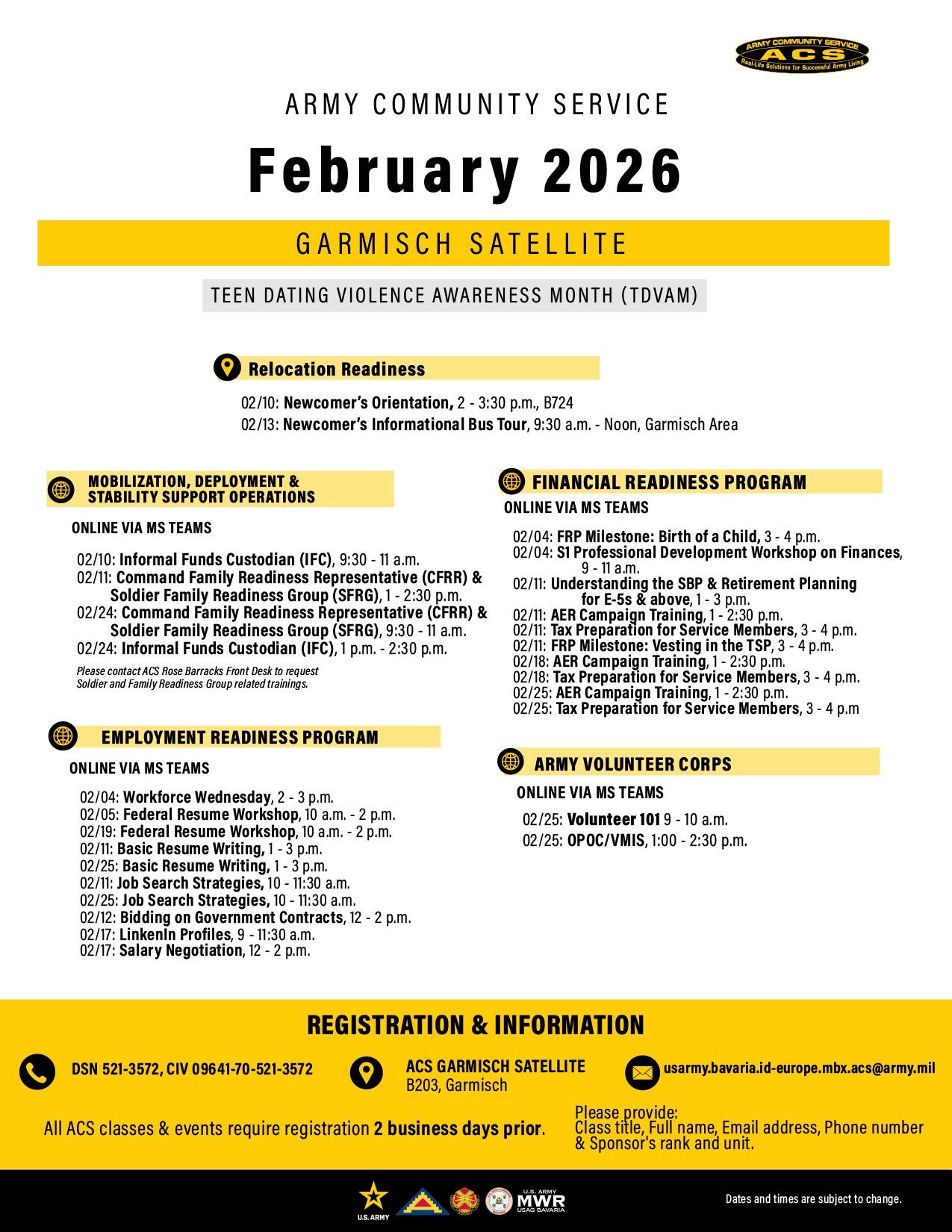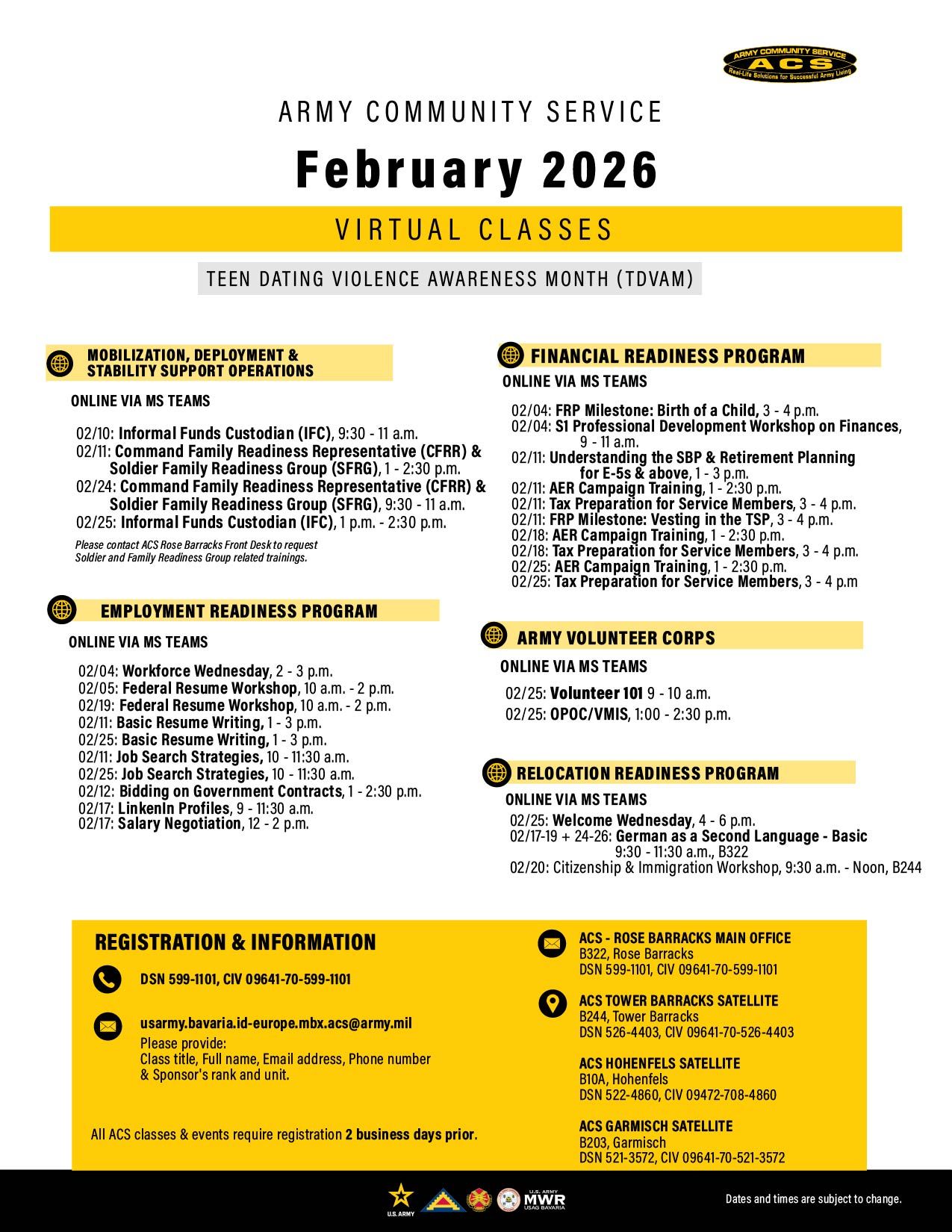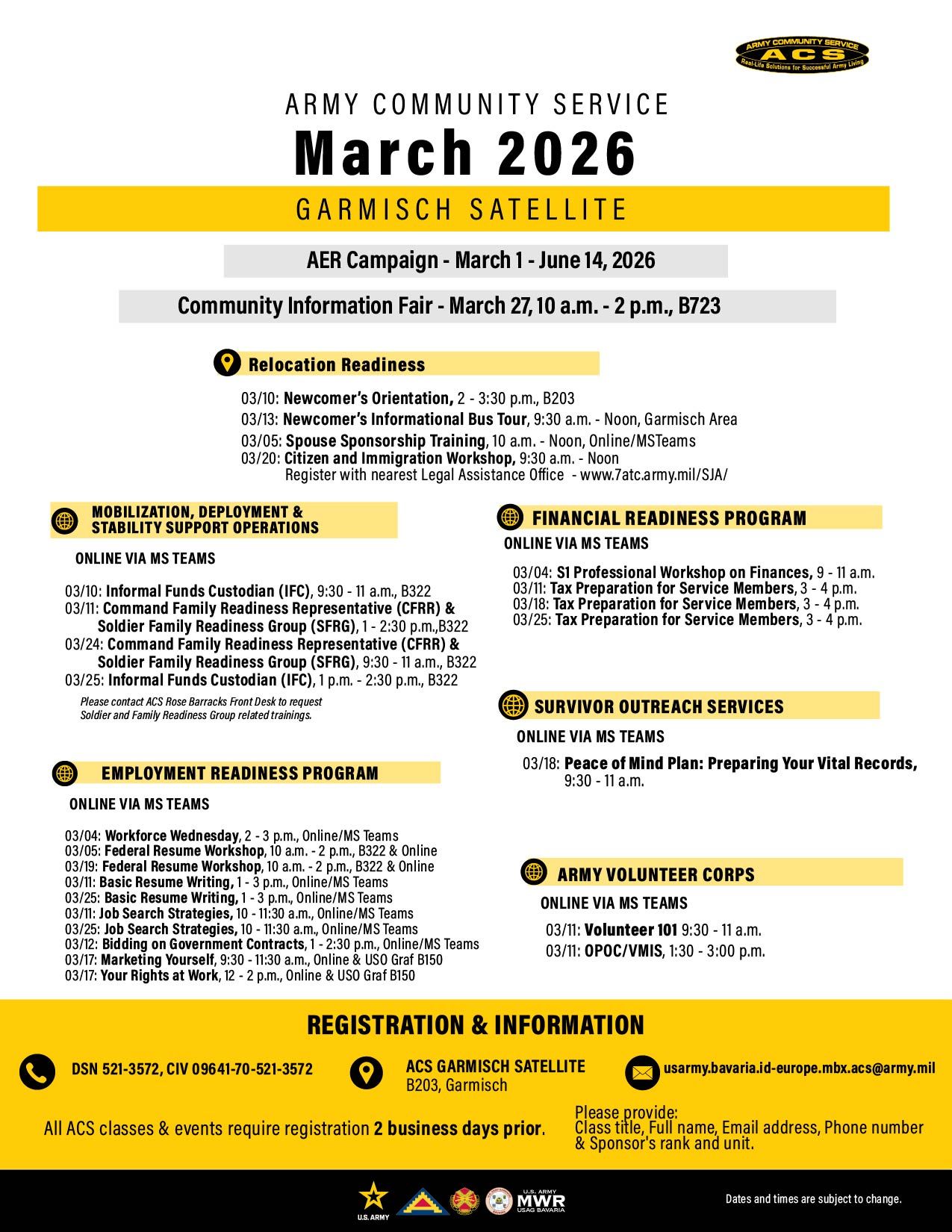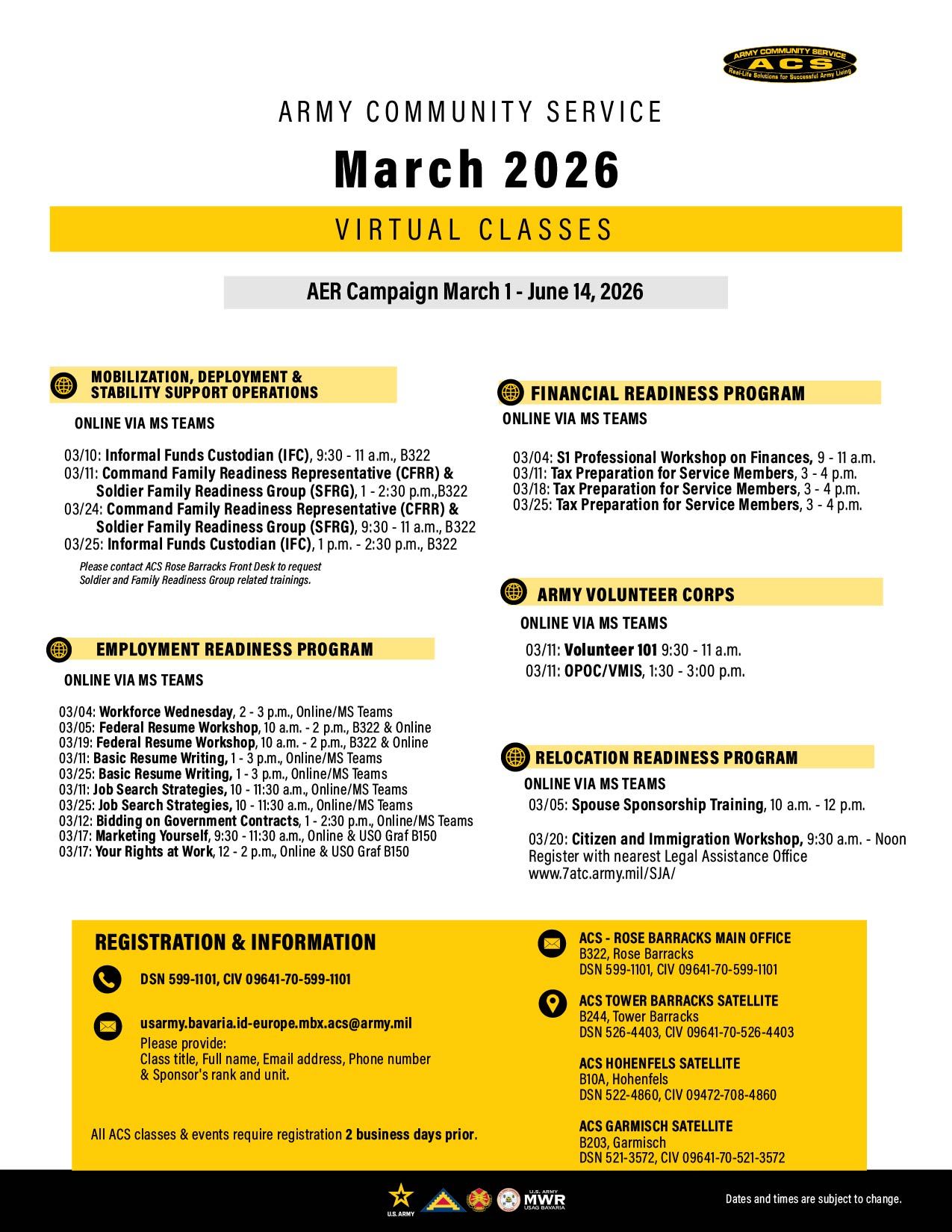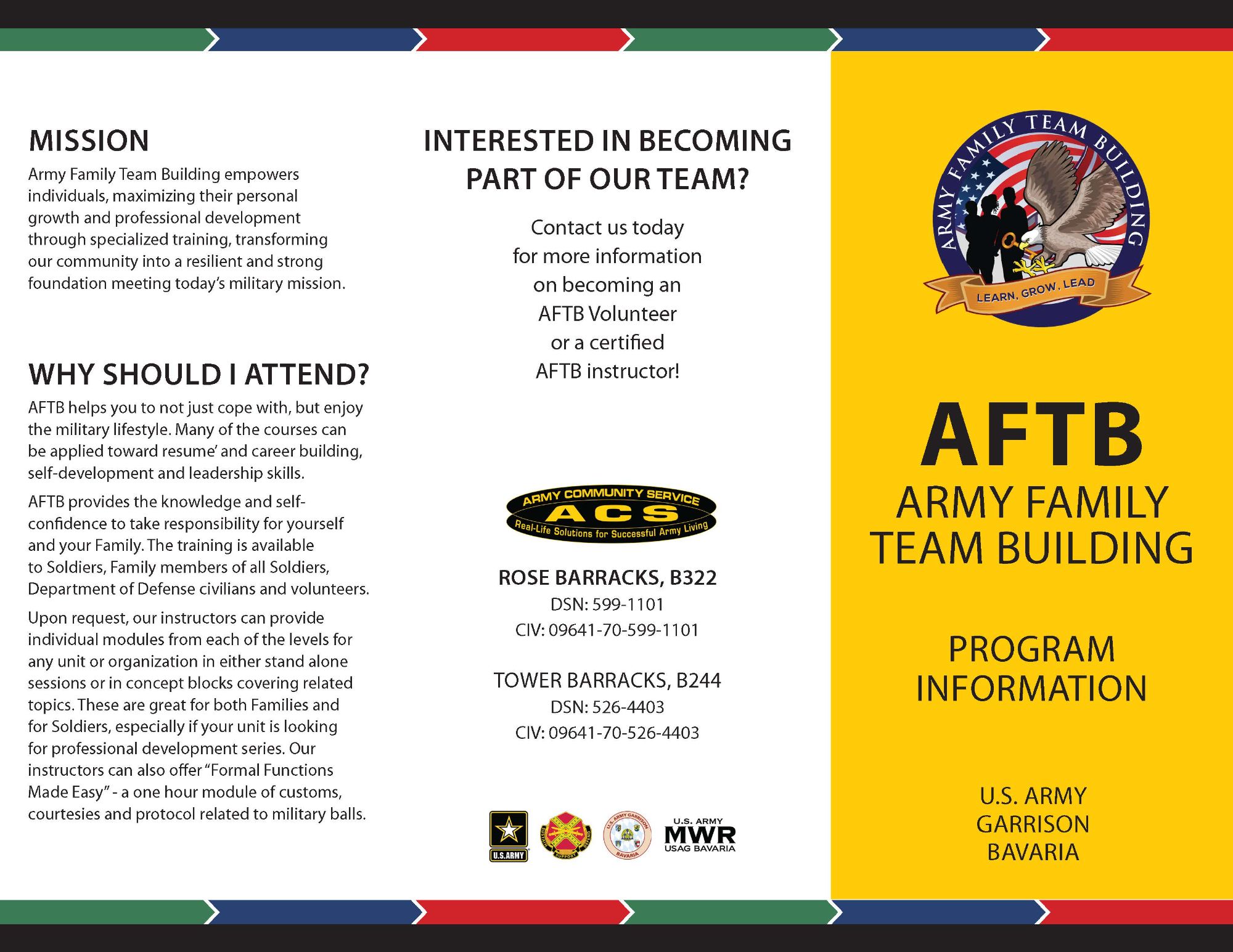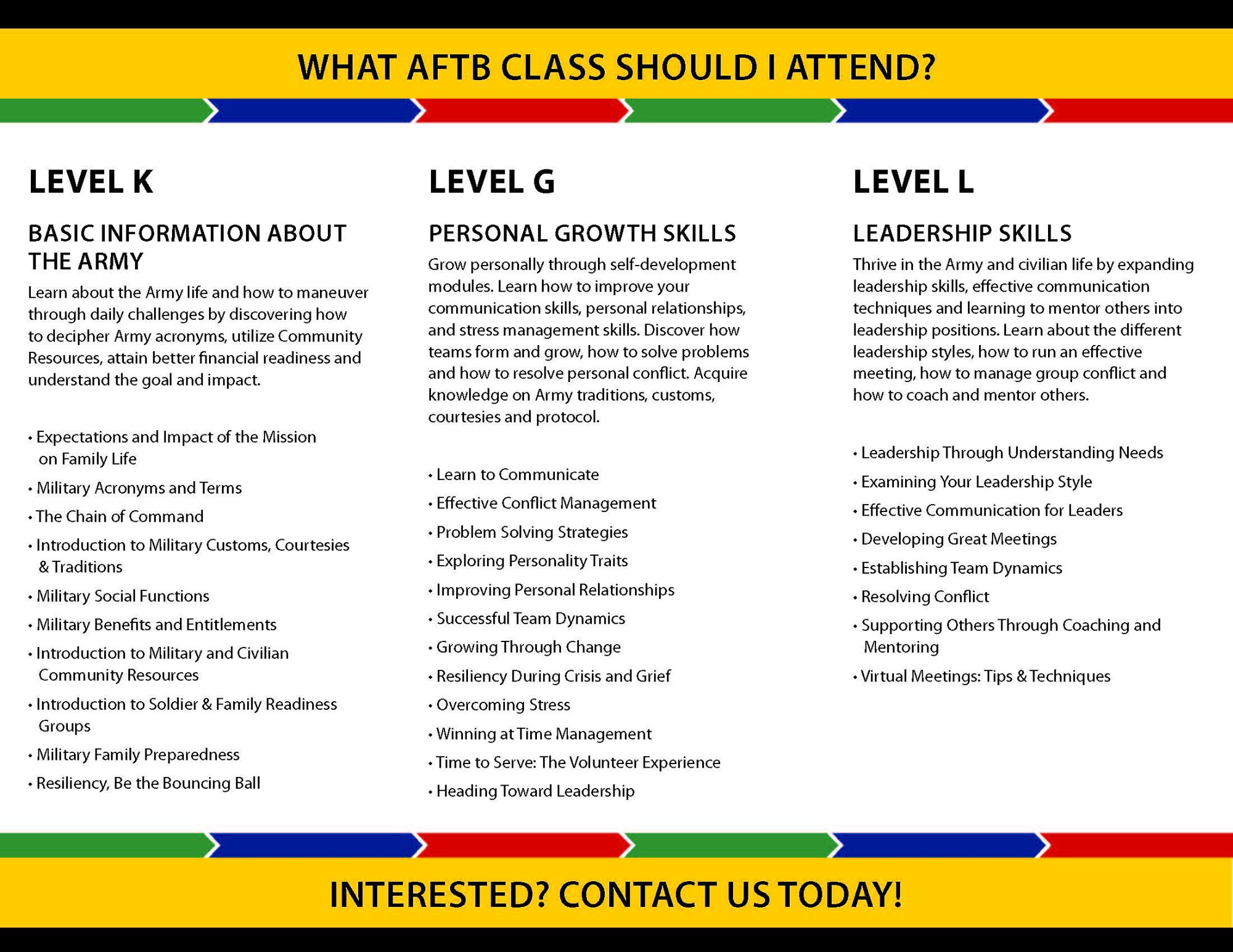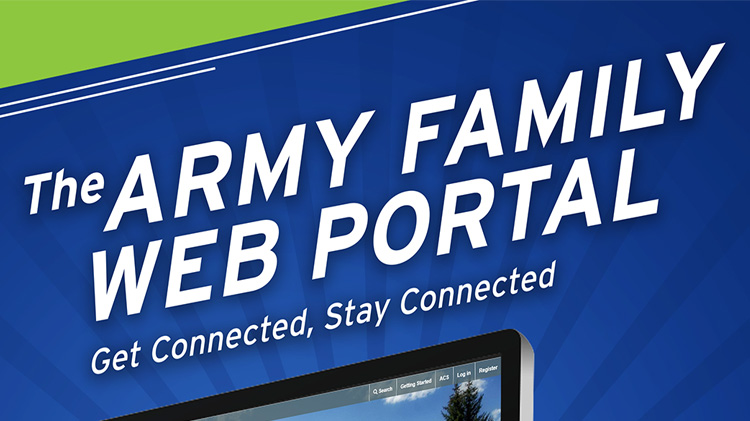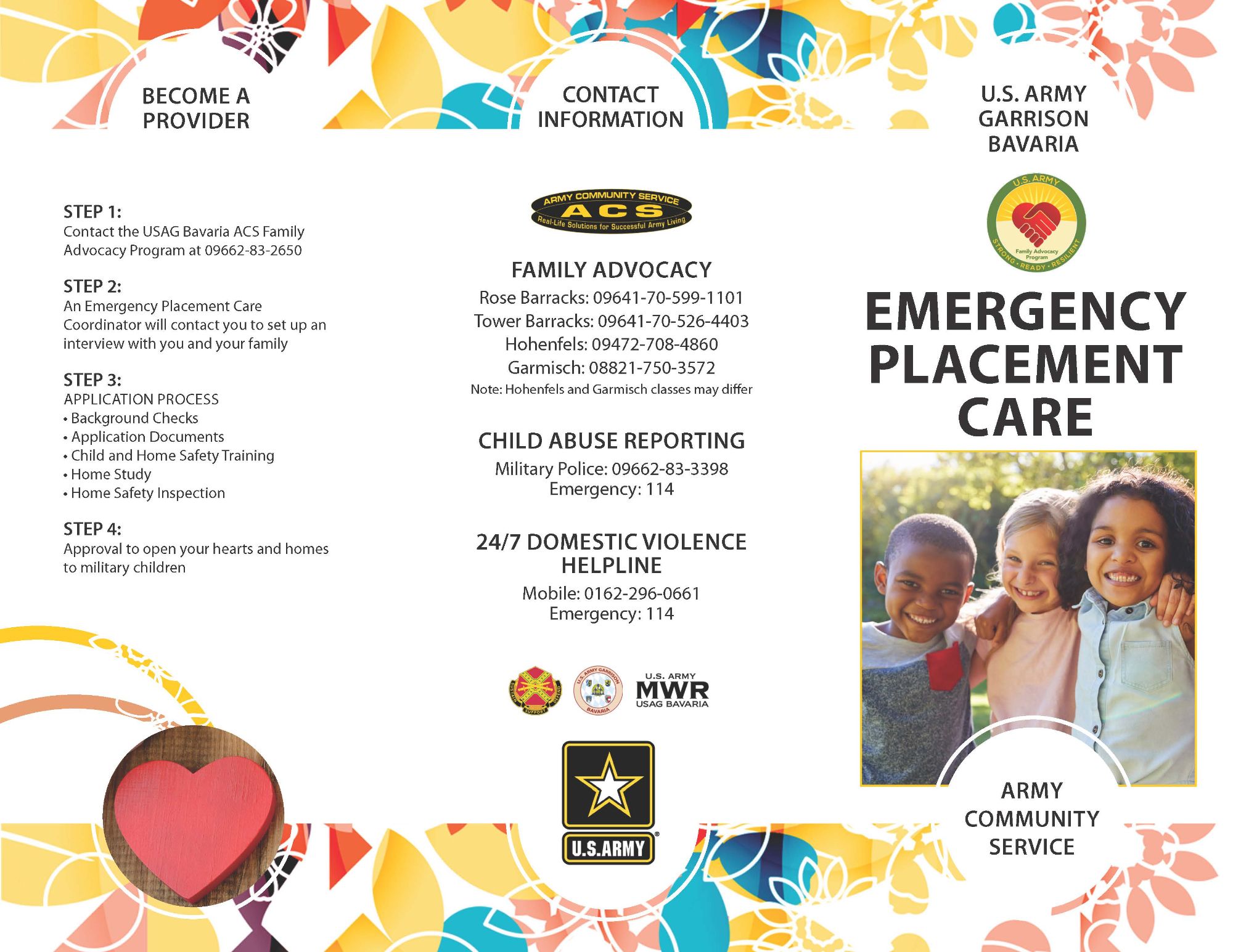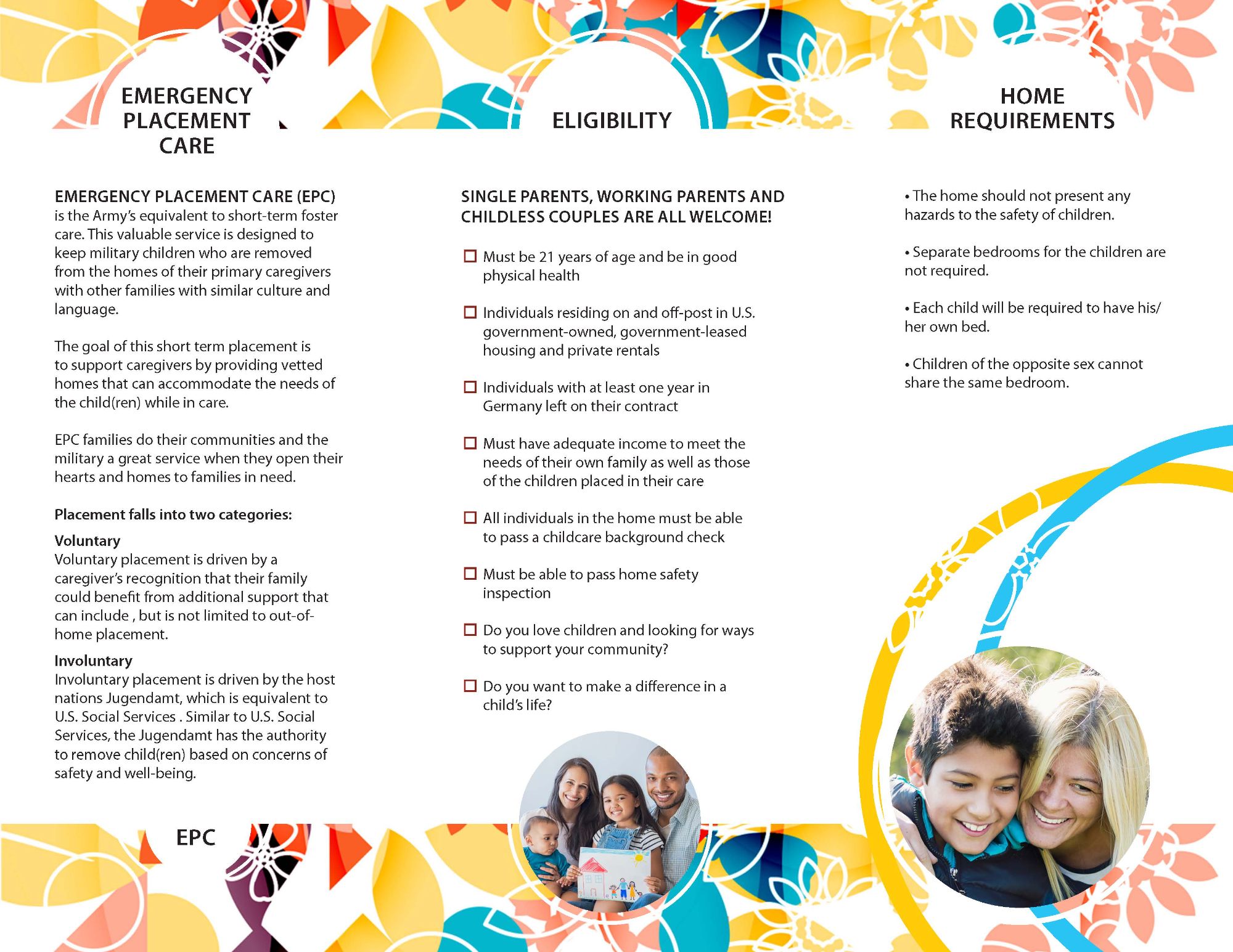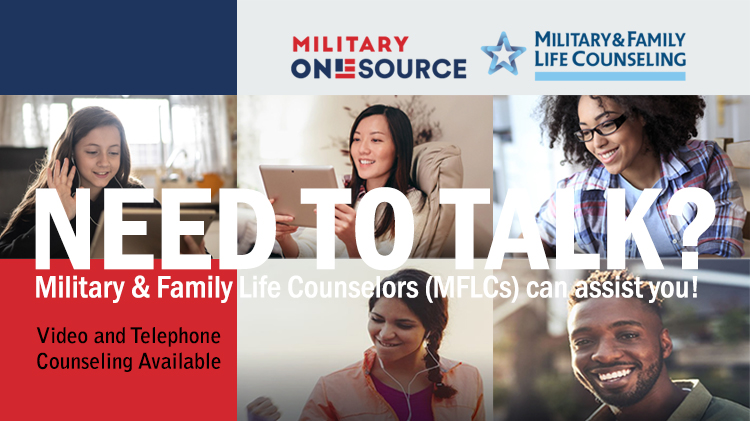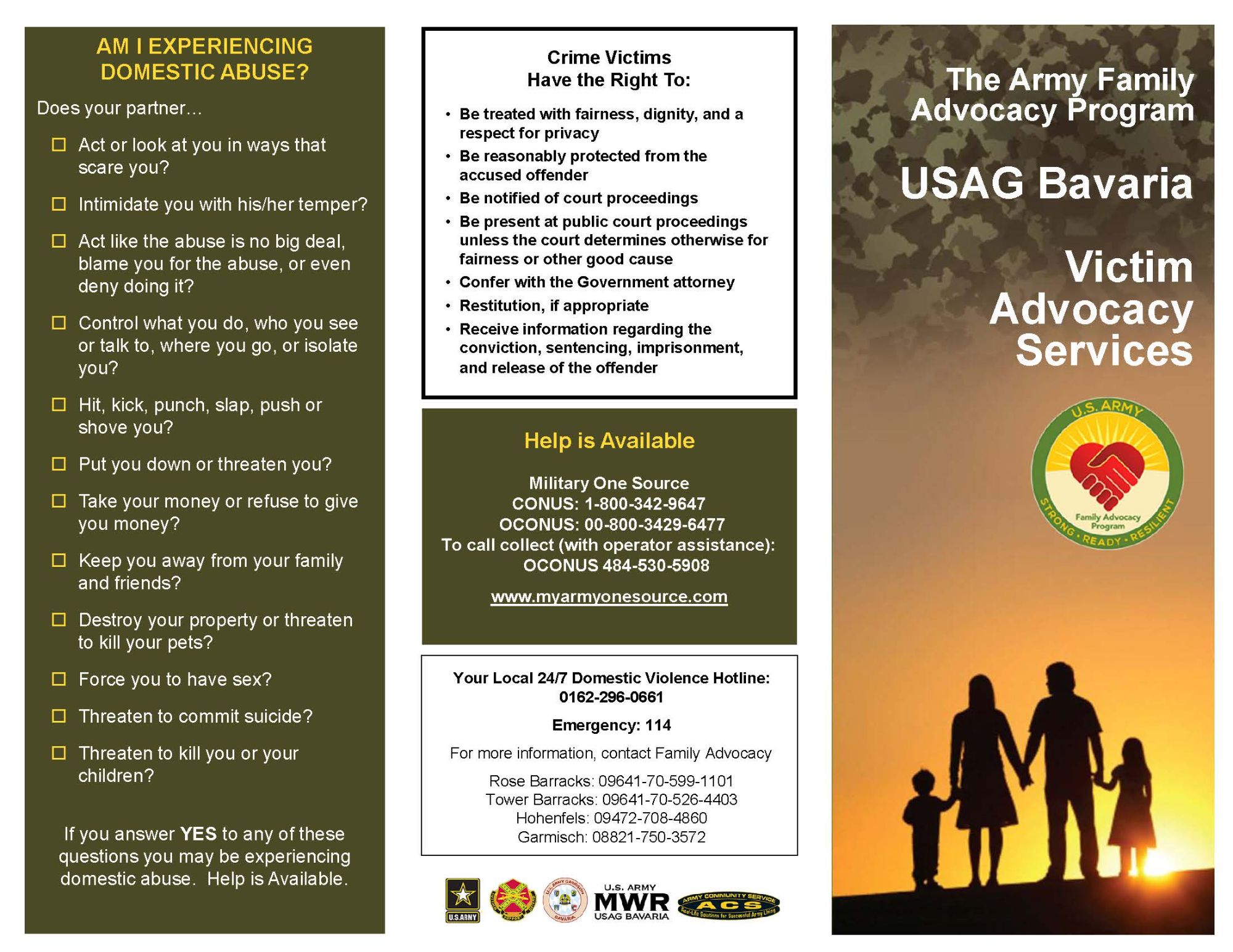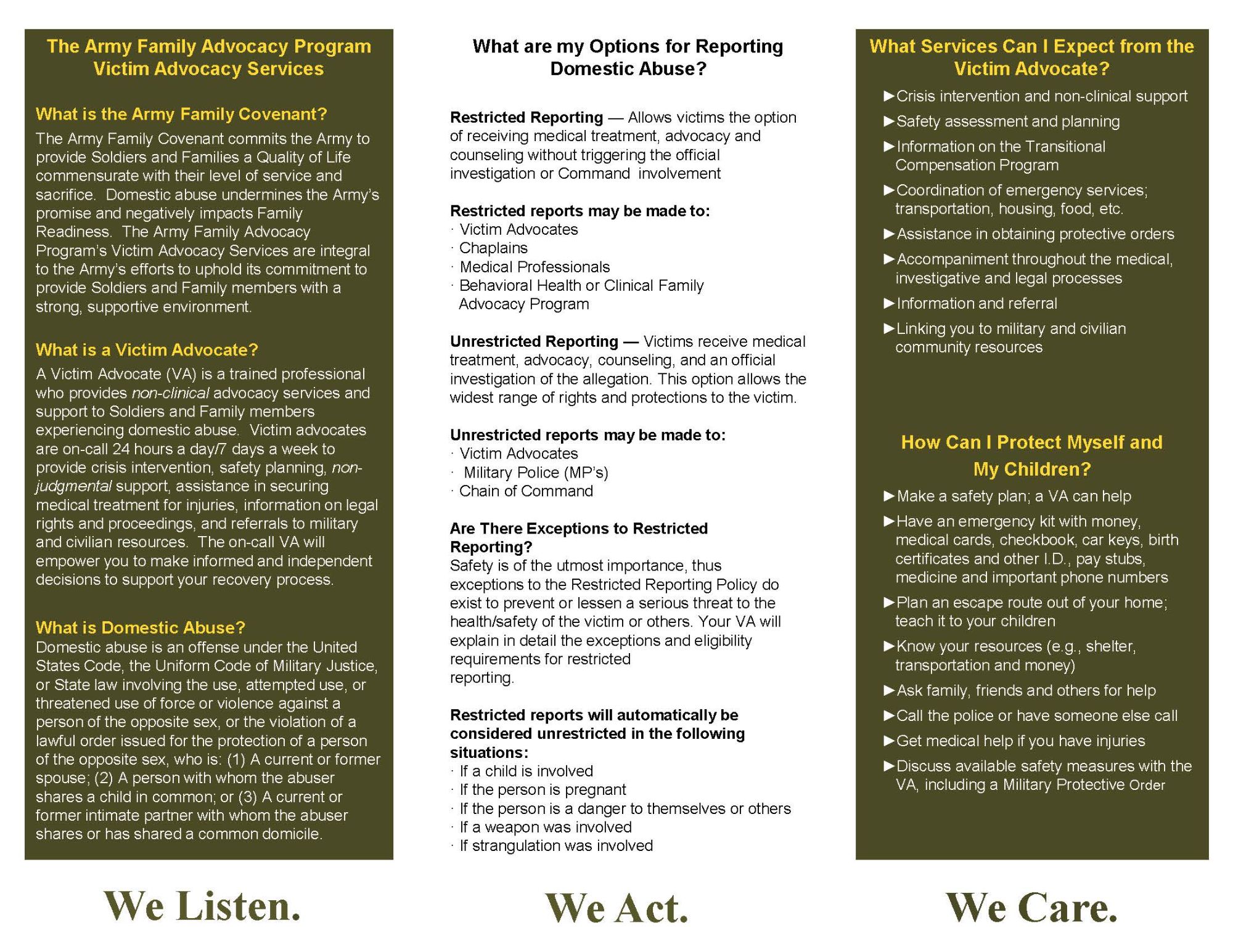- Army Emergency Relief (AER) Loans
-
Army Emergency Relief (AER) Loans
Monday-Friday: 7:30 a.m. - 3 p.m.
*Emergency Leave assistance after 3 p.m. & on holidays,
contact the American Red Cross at:
1-877-272-7337 - Army Family Team Building
- Army Family Web Portal
-
The Army Family Web Portal - great resources for Army Families
- Child & Youth Supervision Policy (USAG Bavaria)
-
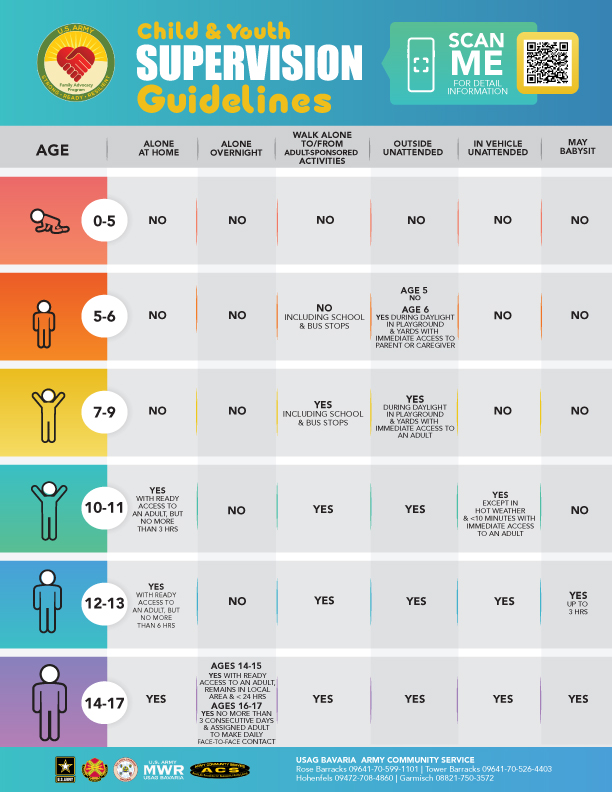
Notes :
1. The U.S. Department of Defense Education Activity may adjust its child– supervision requirements for off-post bus stops if deemed necessary according to local security and safety indicators. School administrators and CYS personnel will inform parents of any local deviations from the requirements in this table. 2.Country– specific or local community guidance applies and is available through the Army Community Services FAP. Youths who wish to babysit (siblings or others) are encouraged to complete the Red Cross Babysitters Course. The number and ages of other children present need to be considered. 3. during the summer, children are considered to be in the grade they just completed until the first day of their next school year. 4. These guidelines do not apply to high-school students who are age 18 or older, nor do they apply to married dependents under the age of 18. 5.5. Homeschooled children will be considered to be in the grade that is consistent with their age (table 2) - Emergency Placement Care
- Family Advocacy Program
-
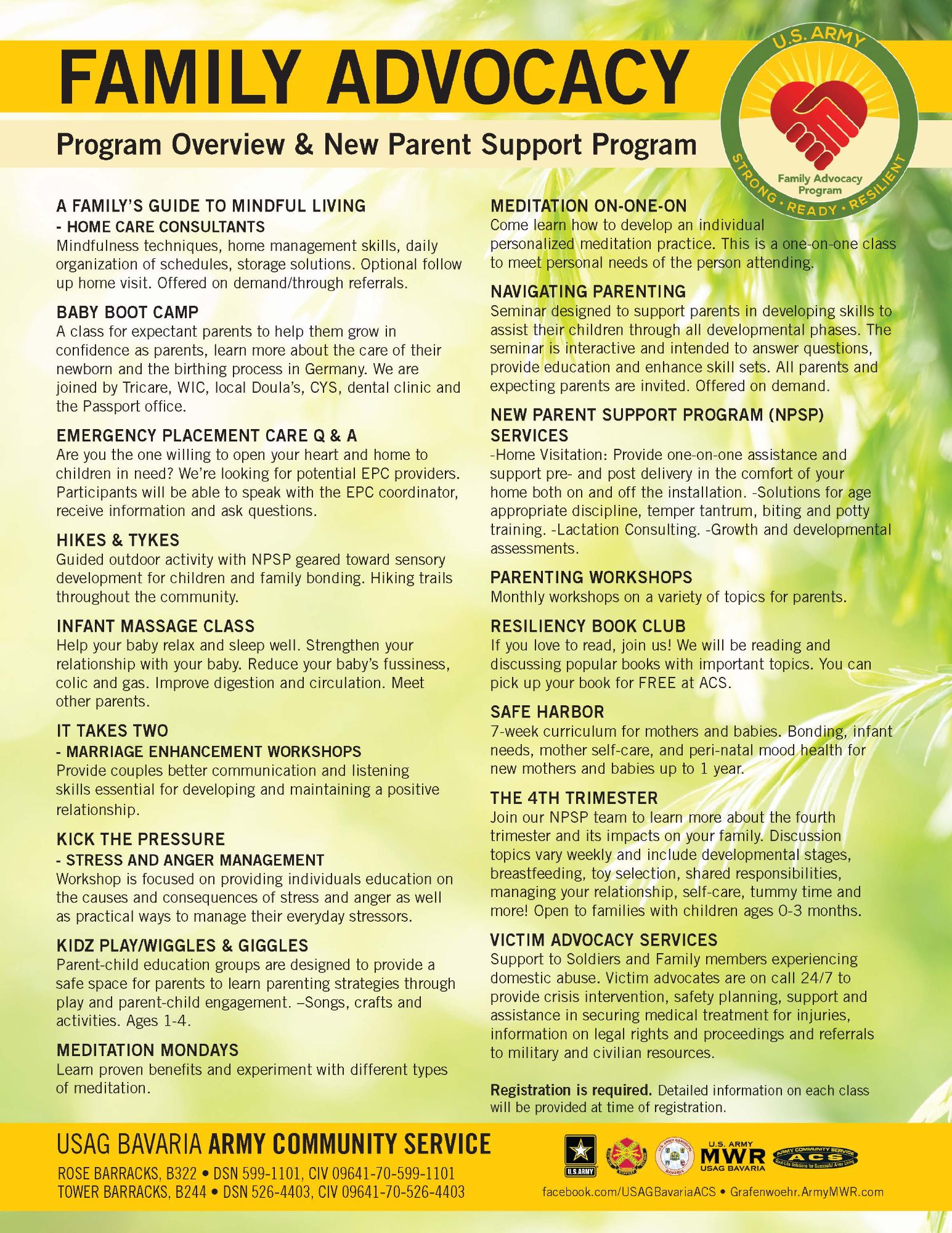
- Financial Readiness
-

- Home Based Business
-
The Employment Readiness Program (ERP) offers resources to help with your career plan and job search. Whether you’re a military spouse or Family member who just moved to a new installation, retiree, DoD Civilian looking for new opportunities, or active duty military, Active Reserve, National Guard member, or Wounded Warrior, we’re here to help.
Our services include:
- Up-to-date information on local, national, and international employment opportunities, job market trends and education, and volunteer resources
- Information on job fairs (in person and virtual) and other hiring events
- Assistance with employment applications
- Career counseling and individual career assessments
- Résumé critiques
- Classes and seminars on self-assessment and career exploration, resume writing, interviewing techniques, dressing for success, networking, and entrepreneurship
- Information on spouse licensure reimbursement (re-licensing at a new duty station can be costly)
*Not all programs and classes are available at all ACS facilities.
Are you ready? Contact your Employment Readiness Program manager (ERPM) for more information.
Additional Resources:
(Government Links)
- Army Spouse Employment, Career and Education Resource Links: a good place start investigating employment options
- Military Spouse Education & Career Opportunities (MySECO): education and career guidance for military spouses
- Military OneSource Spouse Education and Employment: a source for trustworthy guidance on entering the workforce
- The Military Spouse Employment Partnership (MSEP): Military OneSource’s portal to connect spouses and employers
- USAjobs.gov: the Federal Government’s employment portal
- Home Based Business (HBB): options for businesses that operate from on-post quarters
- The U.S. Department of Labor: transition assistance and employment preparation for military spouses
(Non-Government, No Endorsement Implied)
- The U.S. Chamber of Commerce’s Hiring Our Heroes: An initiative that assists veterans, transitioning service members, and military spouses find meaningful employment
- Military and Family Life Counselors (MFLCs)
-
Video Counseling Tips will help you getting the most out of your session.
If you are a Soldier, Spouse or Couple you may contact the following numbers to schedule a session.
TOWER BARRACKS and ROSE BARRACKS
Face to Face
– Rose Barracks: 0173-604-5200 or 0152-5648-3468Telehealth (U.S. Numbers) for web/tele counseling
– Tower Barracks: 619-323-5209Face to Face/Tele-Health (U.S. Numbers) for web/tele counseling
– Tower Barracks: VTC# 619-323-5209 or 173-726-6745 or 0152-2982-4016
Face to Face
– Tower Barracks: 0151-2811-3558 or 0152-5648-3468Face to Face
- 2nd CAV: 0174-886-4024Face to Face
- 91st, 173rd, RES, and 319th BDE: 0174 636 1731Face to Face
- 18th MP BDE: 0174-147-6846Tele-Health until arrival then Face to Face
- 41st FA BDE: 0173-601-2419-----------------------------------------------------------------------
Child and Youth Behavioral MFLCs (CYB-MFLCs) -
Tele-Health until arrival then Face to Face
Free and flexible support, where and when your child needs it.CYS MFLC Rose Barracks: 907-251-0874
-----------------------------------------------------------------------
HOHENFELS:
Face to Face
Adult MFLCs
01516-7147-283
01606-9734-45Child and Youth MFLC
01516-5032-306
-----------------------------------------------------------------------GARMISCH:Telehealth/Virtual (VTC)
Adult MFLC
01514-1996-390
Child and Youth MFLC
01517-4590-487Email Contact:
Adult MFLC: usaggarmisch@magellanfederal.com
Child and Youth MFLC: usaggarmischcyb@magellanfederal.comYou may also schedule telehealth options with Rose Barracks/Tower Barracks MFLCs.
- Relocation Readiness
-
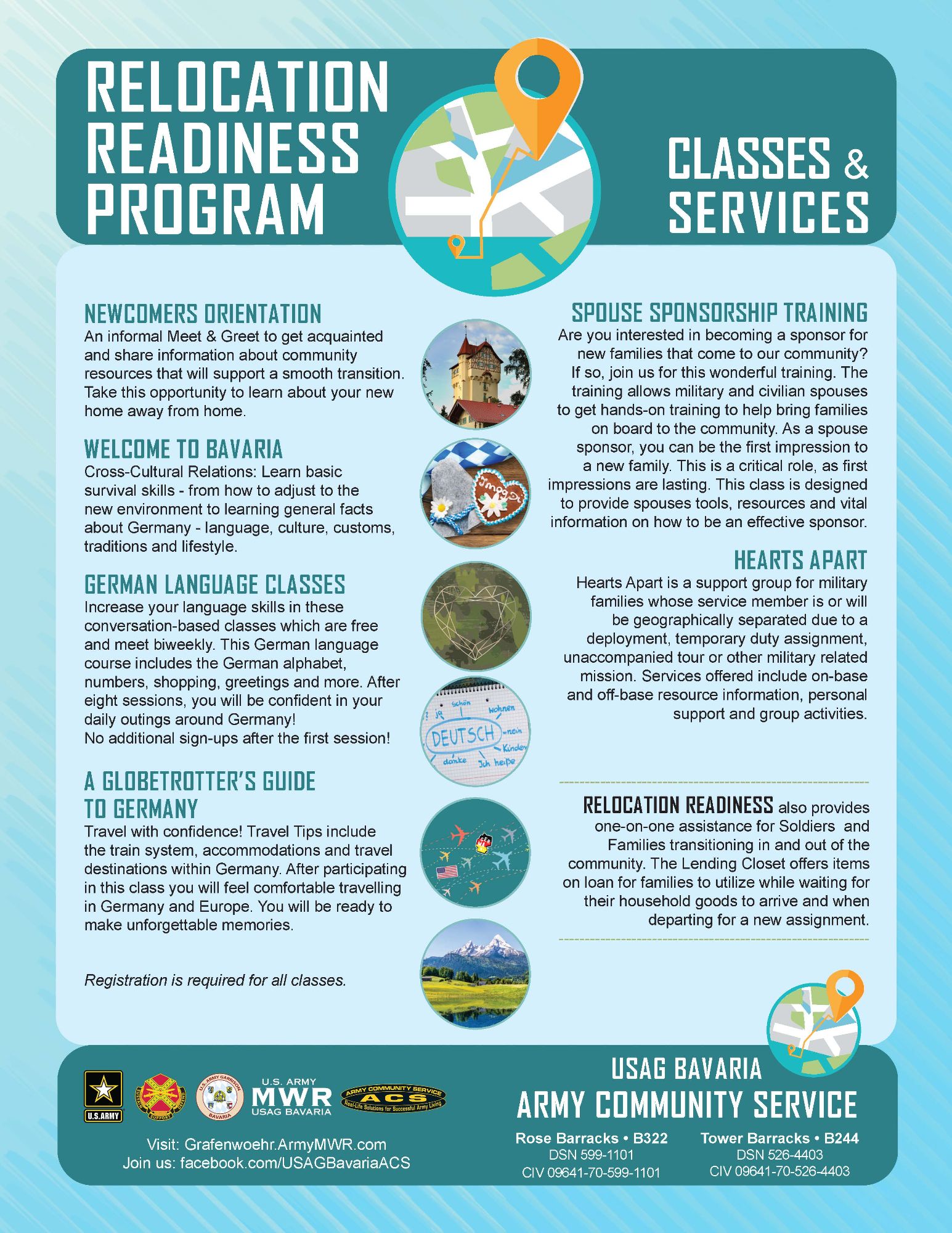
- Relocation Readiness : Lending Closet
-
The ACS Lending Closet has what you need for your PCS to or from Bavaria!
Visit us Monday-Friday: 10 a.m. - 2 p.m.,
by appointment only
Closed: weekends, Federal & German Holidays - Victim Advocacy Services
- Volunteer Program
-
Our volunteer program enables community members to contribute to our installation activities and track their hours. Learn more on our Volunteer Program Page.
- ACS Mission
-
The mission of ACS is to facilitate the commander's ability to provide comprehensive, standardized, coordinated and responsive services that support Soldiers, Department of the Army civilians, and Families regardless of geographical location and to maximize technology and resources, eliminate duplication in service delivery and measure service effectiveness.
- New to the Community? / Relocation Readiness
-
Information & Referral Program
A comprehensive resource file provides information on both military and civilian agencies to Soldiers, family members and DA civilians. Trained personnel will assist clients to find the appropriate and available resources.
Where available, this program offers a special Host Nation Services which includes un-certified translations of host nation language correspondence and bills.
Relocation Readiness Program
Welcome to Relocation Readiness! Moving is a part of life for Soldiers, Government Civilians and their Families. The Army Community Service Relocation Readiness Program provides assistance to the Total Army Family. We are dedicated to ensuring our clients are capable of surviving and thriving through the PCS and ETS processes. We have developed this program to assist you in finding information and resources to make you more resilient and agile as you navigate your next move.
Your first stop once you are notified of a pending PCS or ETS move should be your local ACS (Family Center) where you can meet with a Relocation Readiness Program Manager who will serve as a subject matter expert in assisting you through the process.
Lending Closet
When relocating to a new installation, you can borrow basic household goods from your ACS Lending Closet. Keep in mind that item availability varies from garrison to garrison. Some of the items you may find at your location are:
- Pots and pans
- Dishes
- High chairs and car safety seats
- Pre-paid cell phones (Only at some locations / please call first)
- Kitchen appliances
*Items vary based on installation availability
Adjusting to My New Country*
Host Nation Orientation, where applicable, offers all in-processing personnel and their Families orientation on the local culture, language, transportation and tourism offerings.
ESL materials are available at Army Libraries around Europe. A catalog of all books, audiotapes, and videos can be found here. For additional ESL assistance please contact your ACS.
*If applicable.
Sponsorship Program
This Sponsorship Program is designed to help service members, civilian employees and family members plan their move from a duty station somewhere else in the world to their new duty station in Europe. Below are several links that can assist you during each step of your move.
Pre-Arrival: Planning your move after receipt of your assignment/orders
Post-Arrival: Must-know & nice-to-know information after you get to your new duty station
- Driving In Europe
- Practice USAREUR Driving Test & Study Guide
- SATO Leisure Travel Office
- Europe and Garrison MWR Websites
- Newcomers to the USAREUR Community
For more information on the above services and programs please feel free to give us a call!
- Mobilization, Deployment, and Support Stability Operations
-
The Mobilization, Deployment, and Support Stability Operations (MDSSO) helps support community readiness during deployments and emergencies. We help make sure installation programs align with unit deployment cycles, provide pre- and post-deployment support, and help unit Commanders with their Family Readiness plans and deployment support services for Service Members and their Families. We’re responsible for operating an Emergency Family Assistance Center in the case of an all-hazards event, and supporting Service Members and Families during Non-Combatant Evacuation Operations (NEO) and Repatriation. We also act as a case manager for all requests for assistance through the Army Disaster Personnel Accountability and Assessment System (ADPAAS).
Some of our resources include:
- Pre- and Post-Deployment Support: Help prepare Soldiers and Families for Deployments and Reintegration by providing trainings and resources throughout the Deployment Cycle in a variety of settings.
- Family Readiness Groups: Designed to make sure Families have information you need and develop a military support group while your Soldier is deployed. Virtual Family Readiness Groups also provide secure environments in which the commander can communicate directly with Soldiers and Families 24 hours a day no matter where you are.
- Emergency Family Assistance: Your link to continuous support and assistance as well as authoritative and accurate information in a sensitive, timely, and effective manner.
- Army Disaster Personnel Accountability and Assessment System (ADPAAS): Ensures all Army personnel and their dependents are accounted for during emergency situations.
- NEO/Repatriation: We help the State Department help those who have been displaced after national emergencies and disasters.
For more information on Mobilization, Deployment, and Support Stability Operations support in your community, contact your local Army Community Service office and ask for the Mobilization and Deployment program manager or specialist.
Other helpful links:
- Operation READY: “READY” stands for “Resources for Educating About Deployment and You.” It’s a training and information resource developed from lessons learned in the Persian Gulf War and used in Operation Iraqi Freedom (OIF)/Operation Enduring Freedom (OEF). The training covers learning about the types of military separation, planning and preparing personal documents, and completing family financial arrangements.
- Comprehensive Soldier and Family Fitness (CSF2): Provides hands-on training and self-development tools so that members of the Army Family are better able to cope with adversity, perform better in stressful situations, and thrive in life.
- Taking Care of Business: This video shares information that helps deploying Soldiers make necessary arrangements to ensure that loved ones will be taken care of if the worst happens. It explains which forms and documents to complete before deploying to ensure final wishes are observed.
- PDHealth.mil: A post-deployment resource to help ensure the highest-quality healthcare for those who make sacrifices in the world’s most hazardous workplaces.
For more information and assistance, please contact the program manager at your garrison location.
- Want to Learn about Army Life and How to Contribute More to the Community?
-
Look no further! AFTB and AFAP are here for you!
Army Family Team Building (AFTB)
AFTB is a series of training modules taught through your local Army Community Service or Family Program’s office that cover topics such as basic information about the Army, personal growth skills and leadership skills. AFTB improves personal and Family preparedness which enhances overall Army readiness and helps America’s Army adapt to a changing world.
AFTB helps you to not just cope with, but enjoy the military lifestyle. Many of the courses can be applied toward resume’ and career building, self-development and leadership skills. AFTB provides the knowledge and self-confidence to take responsibility for yourself and your Family. The training is available to Soldiers, Family members of all Soldiers, Department of Defense civilians and volunteers.
My Army OneSource: Army Family Team Building
Contact your AFTB Program Manager more information!
Army Family Action Plan (AFAP)
In addition to learning through the AFTB program, the Army Family Action Plan is your platform to voice your quality-of-life issues, ideas, or suggestions and contribute to help better your community. It’s the best way to let Army leadership know about what works, what doesn’t, and how you think problems can be resolved. We give Active and Reserve Component Soldiers, Army Civilians, Retirees, Survivors, and Family members a primary tool to help identify issues and concerns and shape your standards of living.
You can submit issues at your garrison’s Army Community Service office or to a unit Family Programs liaison. Army OneSource also facilitates AFAP issues online and makes sure your concerns get the attention they deserve. The information you submit gives Army leadership insight and helps foster a satisfied, informed, and resilient Army Community.
AFAP makes a meaningful difference. Since AFAP was created in 1983, 698 issues have been submitted, resulting in 128 legislative changes, 186 Department of Defense or Army policy changes, and 210 improved programs or services.
Here’s a sample of AFAP results:
- Dedicated Special Needs Space in Child, Youth, and School Services (CYSS)
- Distribution of Montgomery GI Bill benefits to dependents
- Annual Leave carryover increase from 60 to 75 days
- Extended educational benefits for Spouses
- Dental and visual insurance coverage for Federal Employees
- Medical Coverage for Activated Reserve Component Families
- Military pay table (targeted pay raises)
- Military Thrift Savings Plan
- TRICARE for Life for eligible Retirees
- Funding for Better Opportunities for Single Soldiers (B.O.S.S.)
- Active Duty Enlisted Soldier Compassionate Reassignment Stabilization
- SGLI increases
- Minimum standards for Army Child Care
- In-state tuition for Military Dependents
To submit an issue or suggestion, go to your local Army Community Service office or Army OneSource.
- In Need of Financial Assistance or Advice?
-
Financial Readiness Program (FRP)
The Financial Readiness Program is your resource for information on money matters. We can help you better understand financial topics like:
- Military pay
- Checkbook/debit card management
- Financial responsibility
- Credit reporting
- Debt elimination strategies
- Saving
- Investing
- Budgeting
ACS also has Financial Counselors available for advice, guidance, and support. In times of emotional distress, figuring out what to do about finances can create a heavy burden. Survivor Outreach Services Financial Counselors provide professional financial information and services in areas such as investing, estate planning, tax issues and basic budgeting. Our Financial Counselors will be there when you need them, for as long as you need them. They are committed to assisting you in creating your financial security and ensuring you receives the necessary information to make sound financial decisions.
We can also help you learn about other financial services, including:
For more information about how the Financial Readiness Program can help you, contact your nearest Army Community Service Center.
Other helpful financial readiness links include:
- Thrift Savings Plan: A Federal Government-sponsored long-term retirement savings and investment plan, available for both Federal civilian employees and members of the uniformed services.
- U.S. Savings Bonds: A shorter-term savings option with competitive interest rates and backed by the full faith and credit of the United States.
- Money Matters: A mobile-optimized resource with calculators for savings, debt reduction and other reference material in one location.
- Financial Literacy Game: A great way to learn about finances, integrating creativity, education and fun in a virtual world.
- Housing Resources for Military Members: The National Military Family Association has compiled a great list of resources to help Military Families who are struggling with the pitfalls of the housing crisis.
- Army OneSource: Network of the services and delivery of support to Soldiers and their Families.
- Military OneSource: A Department of Defense-funded program that provides comprehensive information on every aspect of military life at no cost to active duty, National Guard, reserve members, and their Families.
- Office of Servicemember Affairs: A component of the Consumer Financial Protection Bureau helps to educate and empower military members, veterans, and their Families in the consumer financial marketplace.
- Saveandinvest.org: A project of the FINRA Investor Education Foundation, a free, unbiased resource dedicated to your financial health. Helps you make informed decisions through easy-to-use tools and resources, and arms you with the information you need to protect yourself from investment fraud.
- Better Business Bureau Military Line: Provides specialized education and support services, which meets the needs of active and retired military personnel and their Families.
Family Subsistence Supplemental Allowance (FSSA) Pre-screening
Pre-screening and counseling for Soldiers who qualify for the FSSA entitlement. FSSA is an entitlement authorized by Congress in 2001 and created to supplement the Soldier's Basic Allowance for Subsistence (BAS). This entitlement will not exceed $1100 per month. The application for FSSA is web-based and can be found at: https://www.dmdc.osd.mil/fssa/.
Army Emergency Relief (AER)
Army Emergency Relief (AER) is a private, non-profit organization established to assist Soldiers and their Family members in emergency financial situations due to no fault of their own. Financial assistance is given in the form of an interest-free loan, grant, or combination of the two. Loans are repaid by an allotment.
To apply for AER assistance, the Soldier should be seen by the Unit Commander/1SG for interview/counseling to determine if the situation can be resolved through the chain-of-command or some other source. After determining that the Soldier has a valid emergency, the unit commander would then authorize the individual to seek AER assistance. Soldiers should create an online account with AER to apply for assistance.
Services & Assistance
Army Emergency Relief (AER) is a private, non-profit organization established to assist Soldiers and their Family members in emergency financial situations due to no fault of their own. Financial assistance is given in the form of an interest-free loan, grant, or combination of the two. Loans are repaid by an allotment.
To apply for AER assistance, the Soldier should be seen by the Unit Commander/1SG for interview/counseling to determine if the situation can be resolved through the chain-of-command or some other source. After determining that the Soldier has a valid emergency, the unit commander would then authorize the individual to seek AER assistance.
AER is a private nonprofit organization that provides emergency financial assistance to Soldiers and their Families. AER helps with emergency financial needs:
- Food
- Rent Utilities
- Emergency transportation & vehicle repair
- Funeral expenses
- Medical/dental expenses
- Personal needs when pay is delayed or stolen
- Other emergency financial needs.
AER partners with other military aid societies to enable local assistance for service members from the Air Force, Navy, Marine Corps, and Coast Guard. AER also provides scholarships toward education. AER gives spouses and dependent children of Army Soldiers great opportunities for their first undergraduate degree (some scholarships can reach $4,000 annually)! Application information can be found online at www.aerhq.org. Contact the Army Emergency Relief Program Manager.
Education Programs
AER’s Education Program is a secondary mission to help Army Families with the costs of education. The three separate scholarship programs are:
Stateside Spouse Education Assistance Program
- Applicant must be the Spouse or widow(er) of an active duty or retired Soldier and reside in the United States.
- Stateside applicants must be full time students.
- First undergraduate degrees only.
- Active duty military personnel are not eligible.
Overseas Spouse Education Assistance Program Major General James Ursano Scholarship Fund for Dependent Children.
Overseas Spouse Education Assistance Program
- Applicants must be a Spouse of an active duty Soldier assigned in Europe, Korea, Japan, or Okinawa.
- Applicants must physically reside with the Soldier at the assigned location.
- First undergraduate degrees only.
- Off post students are not eligible.
- Spouses may be part time or full time students.
Major General James Ursano Scholarship Fund for Dependent Children
- Dependent children, stepchildren, or legally adopted children of Army Soldiers on active duty, retired or deceased while in active duty or retired status.
The children of Grey Area Reservists/National Guard are eligible as well.
Scholarship awards will be awarded up to half the cost of tuition. Scholarship awards are based on financial need, as evidenced by income, assets, Family size, and special circumstances.
Applications and instructions are available for all the scholarships on the AER website at www.aerhq.org
Resources & Forms
- Employment, Volunteer, & Training Opportunities
-
Employment Readiness Program (ERP)
The Employment Readiness Program provides information and referral services on employment, education, training, transition, and volunteer opportunities to give Family members the competitive edge needed to secure meaningful employment. ERP offers up-to-date information on available employment opportunities, market and job trends, education, and volunteer resources to help individuals make informed decisions when seeking employment. Services offered by the ERP include classes and seminars related to employment:
- Career exploration
- Resume writing
- Interviewing techniques
- Dressing for success
- Networking
- Entrepreneurship
- Individual career assessment and counseling
Army Volunteer Corps (AVC)
The Army Volunteer Corps plays a crucial role in community involvement and development. Volunteers make a meaningful difference in the lives of Soldiers and their Families every day. Army Volunteer Corps is designed to help you find local volunteering opportunities with organizations that benefit the Army community and allows you to obtain ongoing training and advancement.
The AVC has redefined volunteering within the Army. We embrace existing volunteer programs, unite all volunteers who support Soldiers and Families, including the Active Force, National Guard and Army Reserve, and formalize the Army’s commitment to volunteerism.
No matter where people volunteer in the Army community, they usually want to contribute to Soldiers and their Family members. We recognize this common goal and want to help you find the right opportunity for you.
Volunteering helps your community and helps you as well. When you participate with AVC, you’ll:
- Gain a sense of satisfaction/achievement by meeting challenges
- Learn about the Army, our sister services, and the community
- Acquire new skills and/or expand old ones
- Obtain work experience
- Build new friendships and become a cohesive part of the community
For more information regarding employment, volunteering, or training opportunities please contact your ACS location!
- Family Advocacy Program (FAP)
-
Family Advocacy Program in Europe (FAP-E)
The FAP-E outreach and prevention program is designed to strengthen and improve the quality of life for our military Families by increasing self-sufficiency, resiliency and community cohesion for active duty, Family members, civilians and retirees. Together with garrison and host nation agencies, FAP-E provides a multitude of programs and services designed to build individual and Family strengths as well as advocate for non-violent communities. The goals of the FAP-E are:
- Leverage individual and Family strengths
- Overcome behaviors that may contribute to Family maltreatment
- Value Family member differences
- Enhance behaviors that foster healthy military lifestyles
FAP-E professionals strive to create command and community awareness of the unique challenges associated with living in Europe, provide information on existing services to eliminate child abuse and domestic violence, and to develop specific educational programs at no cost to active duty. Our services include seminars, workshops, and individualized intervention.
FAP-E is dedicated to helping Soldiers and Families address the unique challenges of military life, living overseas and understanding how unmanaged stress can lead to child abuse and domestic violence. Services focus on prevention, education, prompt reporting, investigation, intervention, and treatment. If you need help, please call your garrison’s Family Advocacy Program for more information.
Domestic Abuse Victim Advocate Program (DAVA)
The Domestic Abuse Victim Advocate (DAVA) provides comprehensive support services to adult victims of domestic abuse including: crisis intervention, safety planning, help obtaining medical treatment for injuries, information on legal rights and proceedings, referral to military and civilian shelters, and other resources.
DAVA’s provide information so clients can make informed choices in reporting an assault and how they choose to proceed. DAVA’s are available to accompany adult clients to medical visits, court proceedings, and other appointments as requested. DAVA’s provide services 24 hours-a-day, 7 days-a-week. Victims are not alone, help and support are available.
New Parent Support Program (NPSP)
The New Parent Support Program is a voluntary program that assists military Families who are pregnant or have children birth through age three years understand the process of delivering a baby overseas and adapt to parenthood in healthy and resilient ways.
The primary focus of NPSP is providing individualized home visitation services in the parent and child’s natural learning environment however services can occur in an office, hospital or community setting. Classes and groups are available which provide information on pregnancy, nutrition, parenting newborns and toddlers, problem solving and coping, discipline issues, social isolation, and military stressors. Services are available outside normal duties hours so working parents can participate.
Each NPSP Home Visitor has a Masters degree in Social Work or a Bachelor of Science in Nursing degree and is Licensed to practice Clinical Social Work, Marriage and Family Therapy, or Nursing in a US state.
For assistance or information on any of these Family Advocacy Program – Europe services, call your garrison Army Community Service (ACS) Family Advocacy Program. You can also call Military OneSource for more information and referrals. Call collect with operator assistance OCONUS: 484-530-5908.
- Sexual Harassment/Assault Response Prevention Program (SHARP)
-

Provides awareness and prevention, training and education, victim advocacy, response, reporting and follow-up for sexual harassment/assault issues. Army policy promotes sensitive care, advocacy, treatment, reporting options for victims of sexual harassment/assault and accountability for those who commit these crimes.
Sexual Harassment Complaints
One-third of sexual assault cases begin as incidents of sexual harassment. As a military community, it is important to address sexual harassment complaints immediately when they occur. The SHARP office will assist in finding the appropriate method for addressing the situation. For military personnel and their family members, the SHARP office can assist in the following areas:
- Guidance on how to address sexual harassment issues
- Formal sexual harassment complaint intake
- Informal sexual harassment case intake
- Advocacy in dealing with sexual harassment
- Referral to other agencies and resources as required
Sexual Assault
SHARP office provides advocacy services to victims of sexual assault who are in the military and their immediate family members who are over the age of 18. Victim advocates are certified by the Department of Defense through the National Organization Victim Assistance (NOVA) in Alexandria, VA every two years. Installation SHARP victim advocates (VAs) are well trained and highly educated in the social services field. Advocates can provide sexual assault victims assistance in the following areas:
- Sexual Assault Reporting Options
- Safety Planning
- Resources available for sexual assault victims
- Administrative, legal, and medical process in sexual assault cases.
- Accompaniment to administrative, medical, and legal proceedings
- Referral to counseling services.
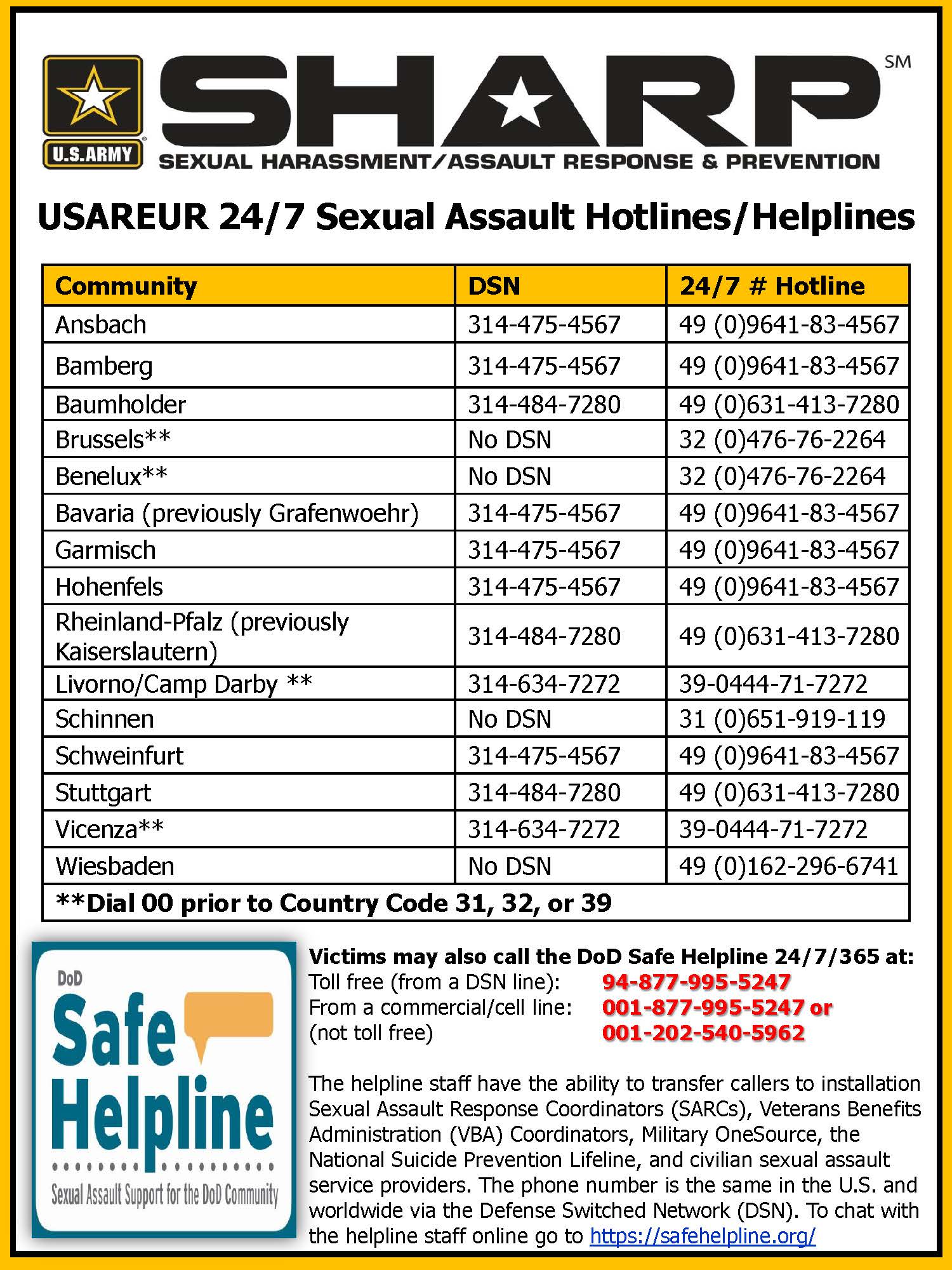
For further assistance and information on the Army Sexual Harassment/Assault Response & Prevention (SHARP) program call DOD Safe Helpline-Sexual Assault Sexual Assault Support for the DOD Community 1-877-995-5247 Live 1-on-1 help. Confidential. Worldwide 24/7. www.safehelpline.org
- Family Members with Special Needs (EFMP)
-
Exceptional Family Member Program (EFMP)

Military Families with a special needs Family member, also known as an Exceptional Family Member (EFM), often require additional help in meeting the EFM’s needs. The Army designed the EFMP to be a comprehensive, coordinated, multi-agency program that provides community support, housing, medical, educational, and personnel services to military Families with an EFM.
The Exceptional Family Member Program (EFMP) is a mandatory enrollment program that works with other military and civilian agencies to provide comprehensive and coordinated community support, housing, educational, medical, and personnel services to Families with special needs. Soldiers on active duty enroll in the program when they have a Family member with a physical, emotional, developmental, or intellectual disorder requiring specialized services so their needs can be considered in the military personnel assignment process.
Family members must be screened and enrolled, if eligible, when the Soldier is on assignment instructions to an OCONUS area for which command sponsorship/Family member travel is authorized, and the Soldier elects to serve the accompanied tour. This screening consists of medical records review for all Family members, and developmental screening for all children 72 months of age and younger.
Soldiers are responsible for keeping their EFMP enrollment current as exceptional Family member (EFM) conditions change or at least every three years, whichever comes first.
Use these resources, tools, and articles to learn more about EFMP and the families it serves.
- Enrollment and Screening Information
- Basic Information (All Branches of Service)
- Army EFMP Basic Information
Special Needs Accommodation Process or now known as the Multi-disciplinary Inclusion Action Team (SNAP/MIAT)
The Special Needs Accommodation Process or now known as the Multi-disciplinary Inclusion Action Team (SNAP/MIAT) is a team established to ensure the most appropriate placement of children with special needs. The team meets to review any new applications for Child, Youth and School Services (CYSS) programs that indicate any possible special needs, review the needs of children already placed in the CYSS program and determine if those needs can be met. Military Members are mandated to enroll in EFMP for most of these conditions and if they are not enrolled, the EFMP Manager will contact the Service Member and suggest that an enrollment screening into EFMP be initiated.
So what is considered a special need?
Basically anything that would requires special attention from a caretaker. It can be illnesses and conditions such as allergies, asthma, attention deficit disorder/attention deficit hyperactivity disorder, diabetes, autism, epilepsy, down’s syndrome, seizure disorder as well as physical challenges, learning disability, sensory impairment (hearing/vision), developmental delays, speech/language impairment, food allergies/intolerances and many more.
The team is comprised of the Exceptional Family Member Program Manager, the Army Public Health Nurse, CYSS Coordinator/CYSS Program Directors, Parent Outreach Coordinator and the Parents/Sponsors/Caregivers. Other appropriate Experts may be able to attend as augmenters if needed/requested. At the meeting the child’s needs are discussed to see if accommodations are necessary and if there are any activity restrictions. Also addressed at the meeting will be the expectations of the service to be provided by the CYSS staff, as well as educational and developmental intervention program information regarding developmental evaluations, and programs and services offered by CYSS.
The goal is to ensure that the child has the very best experience at CYSS and that staff are trained to provide the care that a particular child needs. If your child presents a special need that is new to the staff, they will receive specialized training before your child is entrusted to their care. This training will be in addition to their periodic training that addresses special needs topics that all School Age Care staff receive.
Army EFMP Respite Care
For Active Army and Active Guard and Reserve Families who are responsible for regular care of persons with disabilities, the Exceptional Family Members Program Respite Care Program provides a temporary rest period. Care may be provided in the Family’s home or other settings such as special needs camps and enrichment programs.
The Army EFMP put respite care in place to give eligible Families, especially now with multiple deployments, the opportunity to receive respite care when it’s needed. Families apply for the Respite Care Program at the nearest installation Army Community Service (ACS) EFMP Office.
Eligibility for Respite Care Program is based on EFMP enrollment and the medical or educational condition of the Family member requiring care. Qualifying Families are eligible to receive up to 40 hours of funded EFMP respite care monthly for each certified Family member.
Respite care decreases Family stress, increases Family stability and reduces costly out-of-home placements, thereby contributing to Soldier readiness. Due to increase in mobilization and deployments because of Global War on Terrorism, remaining parent/sponsor has sole responsibility for all Family support needs.
OCONUS, Respite care services can be requested and reviewed by contacting your local ACS EFMP office.
The team is comprised of the Exceptional Family Member Program Manager, the Army Public Health Nurse, CYSS Coordinator/CYSS Program Directors, Parent Outreach Coordinator and the Parents/Sponsors/Caregivers. Other appropriate Experts may be able to attend as augmenters if needed/requested.
- Support for the Wounded, Ill, or Injured
-
Warrior Transition Battalion (WTU)
The Warrior Transition Battalion Europe provides command and control for four Warrior Transition Units serving a 750,000 square mile area. A “triad” consisting of a primary care manager, a nurse case manager, and a squad leader focus on helping each Soldier heal during the Medical Evaluation Board process and return to active duty or assist them return with dignity to civilian life. They provide Mission Command and administrative support to Soldier’s requiring complex care; co-ordinate and synchronize care, treatment, and services through the Triad of Care multidisciplinary team.
Soldier and Family Assistance Center (SFAC)
Soldier and Family Assistance Center services will be tailored and responsive to the needs of the WTU and their Families. Most services will be present in the SFAC location in order to maximize the convenience to the WTs and their Families. Other services requiring less than a full-time presence will be brought forward to the SFAC at designated times. Still other services will be provided through priority off-site appointments coordinated by the SFAC staff. SFAC sites will provide a warm, relaxed environment where Soldiers and their Families can gather to foster physical, spiritual and mental healing.
The services identified to date to be present or coordinated in the SFAC are:
- Entitlement and Benefits Counseling
- Military Personnel Services, such as ID cards
- Educational Services
- Transition/Employment Assistance
- Social services to include financial counseling, stress management, translator coordination and Exceptional Family Member services
- Travel pay for Family members on Invitational Travel Orders (ITO)
- Substance Abuse information and referral for Family members
- Coordination of Legal and Pastoral Services
Contact your local SFAC Representative for more information!
- Survivor Outreach Services (SOS)
-
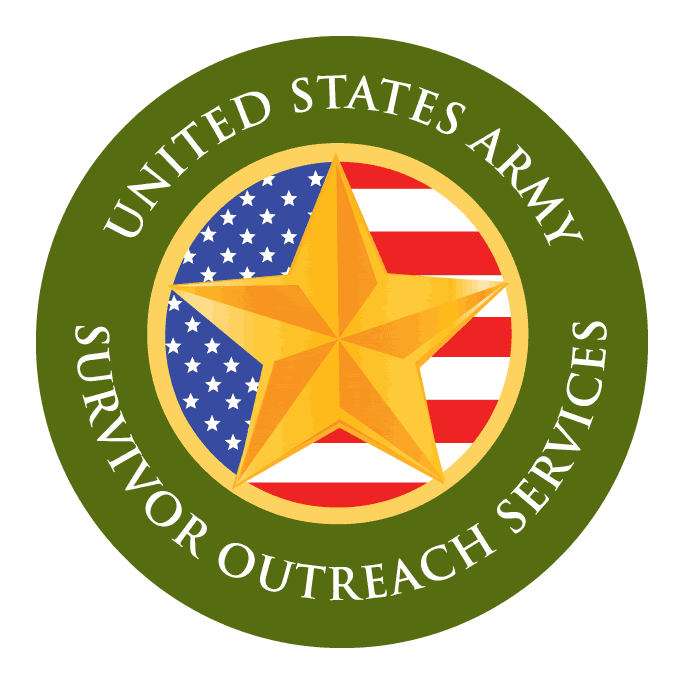
Survivor Outreach Services (SOS)
Our Fallen Warriors have paid the ultimate sacrifice. The Army has a commitment to their Families. Families deserve our respect, gratitude and the very best we can provide.
Survivor Outreach Services is a “one” Army program. Regardless of your loved one’s Army component, duty status, location, or manner of death, Survivor Outreach Services Support Coordinators and Financial Counselors are here to provide dedicated outreach and support when, and for as long as you desire.
SOS offers support through:
Benefits Coordinators. No one is ever fully prepared to lose a loved one, which is why we have Benefits Coordinators. Benefit Coordinators are located at the Casualty Assistance Center and are there to assist and guide you as you make the many decisions necessary following the death of a Soldier. Benefits Coordinators help identify your specific benefits and entitlements and ensure you receive what is legally yours. They assist you in completing paperwork and navigating the various agencies Survivors encounter. Benefits Coordinators remain current on changes in the law and have a wealth of information available to support you during this very difficult time.
Financial Counselors. In times of emotional distress, figuring out what to do about finances can create a heavy burden. Survivor Outreach Services Financial Counselors provide professional financial information and services in areas such as investing, estate planning, tax issues and basic budgeting. Our Financial Counselors will be there when you need them, for as long as you need them. They are committed to assisting you in creating your financial security and ensuring you receives the necessary information to make sound financial decisions.
Support Coordinators. The Survivor Outreach Services Support Coordinator provides long term support to you and is your link to the Army Family for as long as your desire. Wondering what direction to go in now? Your local Support Coordinator is happy to sit down with you as you journey through this transition by providing direct services as well as information, referrals and recommendations. They can also connect you with support groups, bereavement and financial counselors, as well as help you request copies of documents obtain answers to questions and direct you to additional Survivor resources.
For more information contact your local SOS Support Liaison!
ABOUT THE GOLD STAR AND NEXT OF KIN LAPEL BUTTONS
In 1947, Congress* approved the use of the Gold Star Lapel Button as a way to recognize the families of service members who lose their lives while engaged in action against an enemy of the United States. In 1977, the Army approved issue of the Lapel Button for the Next of Kin of Deceased Personnel to honor those who lose their lives while serving on active duty or while assigned in a Reserve or National Guard unit in a drill status. Issue of the button is retroactive to 29 March 1973."
These small lapel buttons, or pins, as they are commonly called, are normally presented to eligible family members prior to the military funeral service. Although they are less than an inch in size, they are packed with great meaning and emotion. They are not awards. They are symbols of honor. Here is how you can tell them apart.
GOLD STAR LAPEL BUTTON
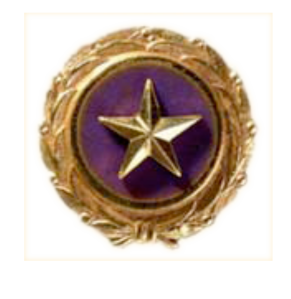
This symbol consists of a gold star on a purple background, bordered in gold and surrounded by gold laurel leaves. It is designated for eligible survivors of service members who lose their lives during any armed hostilities in which the United States is engaged, dating back to World War I. This includes service members who lose their lives while deployed in support of military operations against the enemy or during an international terrorist attack.
NEXT OF KIN OF DECEASED PERSONNEL LAPEL BUTTON

This symbol consists of a gold star within a circle that commemorates his or her honorable service. The gold star is also surrounded by sprigs of oak that represent the branches of the Armed Forces. It is designated for eligible survivors of service members who lose their lives while serving honorably under circumstances not defined above. This includes service members who lose their lives while assigned to a Reserve or National Guard unit in a drill status. It is authorized for issue retroactive to March 29, 1973.
Who can wear the pin?
The family members entitled to receive and wear these symbols are the widow or widower; each child, stepchild, and child through adoption; each brother, half brother, sister, and half sister; and each of the parents (this includes mother, father, stepmother, stepfather, mother through adoption, father through adoption, and foster parents in loco parentis).
I did not receive a pin, where do I get one?
If you are an eligible family member, but did not receive the lapel button to which you are entitled, you can request one through the National Archives. You can also apply for a replacement should yours ever be lost or damaged. If you would like help applying for a new or replacement Lapel Button, contact Army Survivor Outreach Services.
*The descriptions on this page are intended to provide an overview of the public law governing the distribution of Gold Star lapel buttons. To view the law in its entirety, click here.
For more information on the Gold Star and Next of Kin Lapel Buttons please visit Gold Star and Next of Kin Lapel Buttons information
Symbols of Honor: Blue Star and Gold Star Service Flags
The Blue Star Service Flag
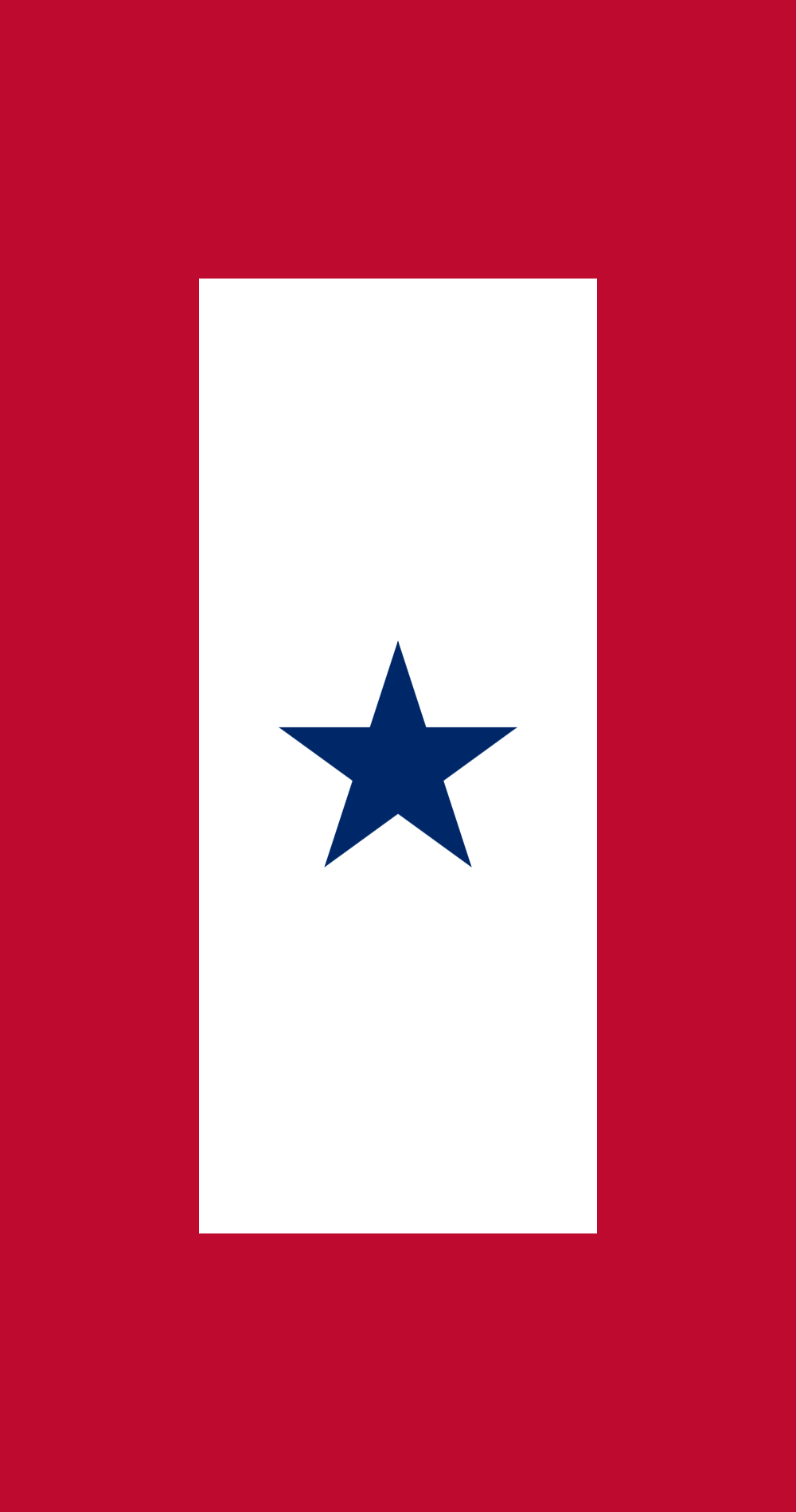
Blue Star Service Flag: Patented by retired Army CPT Robert Queissner in 1917, the Service Flag, also known as a Blue Star Flag or Service Banner, represents a family member serving in the Armed Forces during a time of conflict.
The Gold Star Service Flag
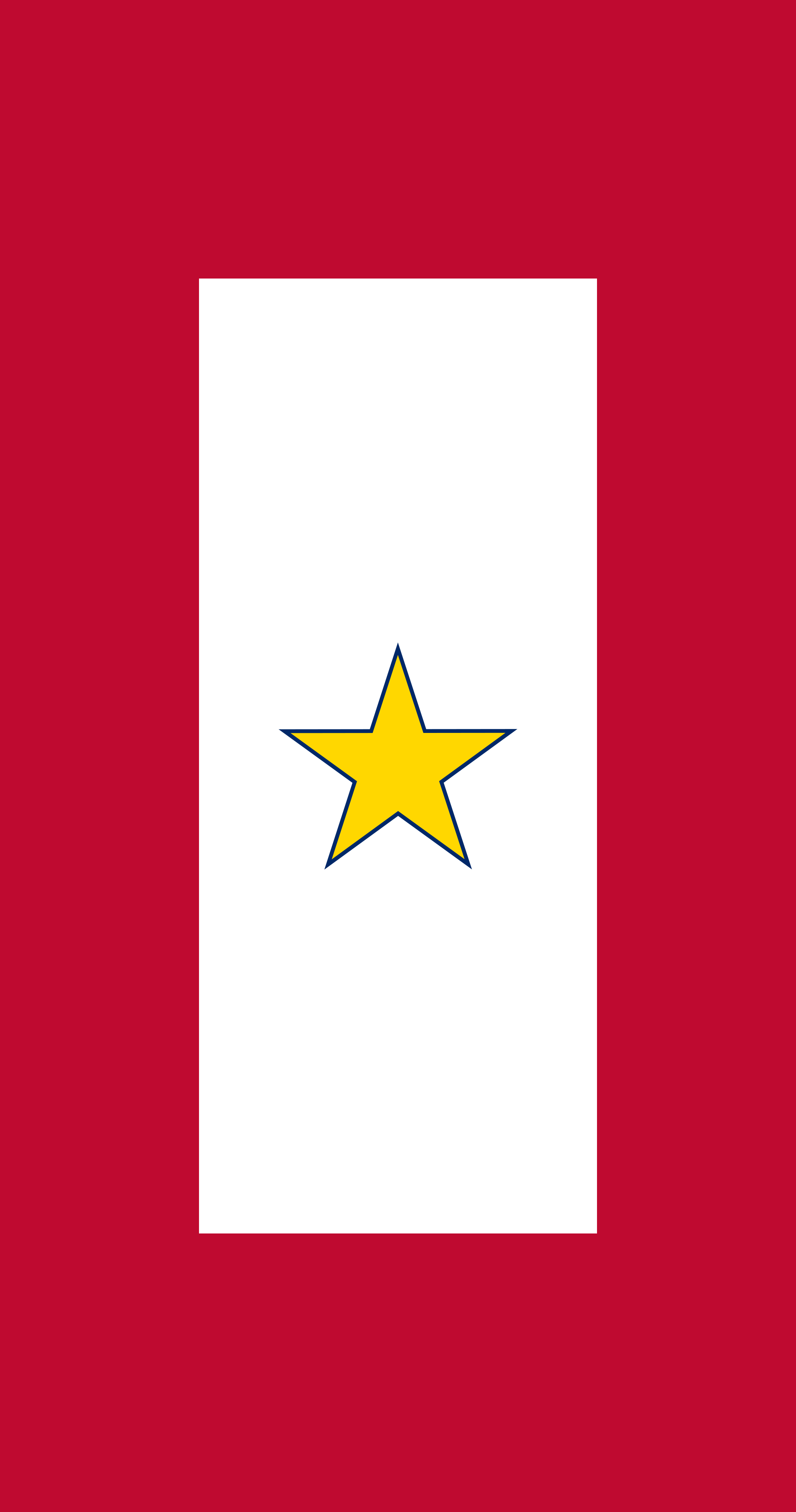
The Gold Star Service Flag: Created in 1918 after President Woodrow Wilson approved a suggestion allowing mothers who lost a child serving in the war to wear a gold gilt star on the traditional black mourning arm band.
Service Flags were officially authorized by Congressional Act 36 U.S.C. 179-182 (1967), the Service Banners are usually displayed in a window of a home where an immediate Family member of a service member resides. Service flags may be displayed for the duration of the conflict.
For more SOS Information, please visit the links below:
- Frequently Asked Questions
-
1. Are there individual and/or group counseling available?
Garmisch does not have a Behavioral Health Clinic. Military and their family members can meet with the Military Family Life Consultant(MFLC) for counseling up to seven sessions. Garmisch does not have a Behavioral Health Clinic so group counseling is not available. The only counseling that is available at ACS is individual counseling related to Financial and Employment Readiness.2. Where can I find the phone numbers?
The ACS phone number is DSN 440-3572 or CIV 08821-750-3572.3. Where can I find the email address?
ACS email address is the following: usarmy.garmisch.imcom-europe.mbx.army-community-service@mail.mil4. What are the signs of child abuse and neglect?
Child abuse is the physical or mental injury, sexual abuse or exploitation, or negligent treatment of a child. It does not include discipline administered by a parent or legal guardian to his or her child provided it is reasonable in manner and moderate in degree and otherwise does not constitute cruelty. Possible signs of child physical abuse include, but are not limited to, brain damage, skull fracture, shaking and twisting, poisoning, burns, dislocations, cuts, bruises (in suspicious areas, such as the neck and back), and welts. Children who are emotionally abused may exhibit attachment abnormalities, behaviors to indicate perfectionism, unusual emotional responses, and self-destructive behaviors. Signs of child sexual abuse may be an extraordinary sexual knowledge for age of development or inflammation, bruises, pain or itching in the genital area.Child neglect is a type of child abuse/maltreatment whereby a child is deprived of needed age-appropriate care by act or omission of the child's parent, guardian, or caregiver; an employee of a residential facility; or a staff person providing out-of-home care under circumstances indicating that the child's welfare is harmed or threatened. Child neglect includes abandonment, deprivation of necessities, educational neglect, lack of supervision, medical neglect, and/or nonorganic failure to thrive. Children who are neglected may have intense hunger, may have a dirty appearance, maybe overly tired, may have frequent illnesses or absences, may be unusually quick to bond with adults who give attention, and may also demonstrate unusual emotional responses.
Another form of child abuse is that of domestic abuse/violence witnessed in the home, as "violence witnessed is violence experienced". Witnessing violence in the home may be considered a "failure to protect" which can be considered a form of neglect or a form of emotional abuse. The effects on children Include: Taking responsibility for the abuse; constant anxiety and stress-related disorders; guilt for not being able to stop the abuse; guilt for loving the abuser; fear of abandonment; social isolation; difficulty interacting with peers and adults; and low self-esteem.
If you have concerns about a child(ren), please report your concerns to the Reporting Point of Contact (RPOC) in your community.
5. What are the signs of domestic abuse?
Domestic abuse is an incident or incidents that indicate an emerging pattern or risk of further victimization of the spouse/partner. Excluded are behaviors indicative of marital discord with the absence of abusive acts (for example, arguments or disagreements regarding child rearing, financial management, and so on). Spouse/partner maltreatment incident indicators may include one or more of the following:-A pattern of intentional acts of berating, disparaging or other verbally abusive behavior that adversely affects the psychological well-being of the spouse or partner.
-Coercive control and/or threatening behavior including terrorizing behavior (for example, threats to children, pets, or property).
-A pattern of restricting or withholding economic resources for the purpose of controlling the spouse/partner.
-A pattern of intentional intimidation for the purpose of controlling the spouse/partner.
-Isolation of a partner from Family, friends, or social support resources.
-Chronic intentional interference with cultural adaptation.
-Physical assault(s) or threat(s) of physical violence with or without a weapon.
-An act which by itself or in conjunction with other conduct constitutes stalking.
-Sexual assault(s), threat(s) of sexual assault, or coercing a partner to engage in undesired sexual activity with offender or other persons.
-Obstructing a partner from receiving medical services.
-Intentional neglect by refusing or obstructing a mentally/physically incapacitated spouse from receiving appropriate social, mental, or medical services.
There are many signs of an abusive relationship. The most telling sign is fear of your partner. If you feel like you have to walk on eggshells around your partner-constantly watching what you say and do in order to avoid a blow-up-chances are your relationship is unhealthy and abusive. Other signs that you may be in an abusive relationship include a partner who belittles you or tries to control you, and feelings of self-loathing, helplessness, and desperation.
General warning signs of people who are being abused may seem afraid or anxious to please their partner, go along with everything their partner says and does
-Check in often with their partner to report where they are and what they're doing
-Receive frequent, harassing phone calls from their partner
-Talk about their partner's temper, jealousy, or possessiveness
People who are being physically abused may have frequent injuries, with the excuse of "accidents", frequently miss work, school, or social occasions, without explanation, and/or may dress in clothing designed to hide bruises or scars (e.g. wearing long sleeves in the summer or sunglasses indoors).
People who are being isolated by their abuser may be restricted from seeing family and friend, rarely go out in public without their partner, and/or have limited access to money, credit cards, or the car.
People who are being psychologically abused may have very low self-esteem, even if they used to be confident, show major personality changes, or be depressed, anxious, or suicidal.
6. Do I have to enroll my family member in EFMP?
Military and civilians are required to do an EFMP screening before receive their orders. Garmisch does not have an Army Health Clinic. EFMP screening must be done to ensure EFMP family needs are being met. Families that have newborns born in Garmisch must conduct their EFMP screening with the US Army Health Clinic in Hohenfels within 6 months of birth. Newborns must have an EFMP screening before enrolling in Child Development Services.7. What jobs are available?
ACS has a board that lists jobs that are available in the community. Job openings are listed at www.usajobs.gov.8. What classes are available?
ACS offers the following classes: Host Nation Orientation, Host Nation Customs and Courtesies, Conversational, German Financial Readiness, Employment Readiness, and Child Abuse Awareness. Other class may be available upon request.9. Are there AA classes?
There are no AA Group meetings at ACS. There is an English Speaking AA Group that meets every week in Garmisch. Contact ACS for details.10. What kind of support programs are available?
The only support program available at ACS is the New Parent Support Program. It is for families that are expecting a newborn up to children of four years of age.11. NEED TO TALK?
Military and Family Life Consultants (MFLC) are available to help Service Members and their families and can assist individuals, couples, families and groups. To schedule a time to meet, call 0170-708-0744.
Army Community Service (ACS)
-
ACS - Army Community Service
-
Military DSN (314) 521-3572
-
Emergency Placement Care - ACS
-
Military DSN (314) 521-3572

